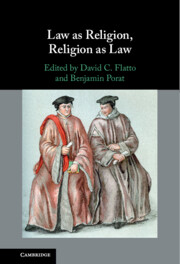Law As Religion, Religion As Law
The conventional approach to law and religion assumes that these are competing domains, which raises questions about the freedom of, and from, religion; alternate commitments of religion and human rights; and respective jurisdictions of civil and religious courts. This volume moves beyond this competitive paradigm to consider law and religion as overlapping and interrelated frameworks that structure the social order, arguing that law and religion share similar properties and have a symbiotic relationship. Moreover, many legal systems exhibit religious characteristics, informing their notions of authority, precedent, rituals and canonical texts, and most religions invoke legal concepts or terminology. The contributors address this blurring of law and religion in the contexts of political theology, secularism, church-state conflicts, and the foundational idea of divine law. This title is also available as Open Access on Cambridge Core.
David C. Flatto is Professor of Law and Jewish philosophy at The Hebrew University of Jerusalem. His most recent book is The Crown and the Courts: Separation of Powers in the Early Imagination (Harvard University Press, 2020).
Benjamin Porat is Professor of Law, Vice-Dean of the Faculty of Law, and the Director of the Matz Institute for Research in Jewish Law, at The Hebrew University of Jerusalem. He is the author of The Principles of Welfare Regulations: From Biblical Law to Rabbinic Literature (2019).

